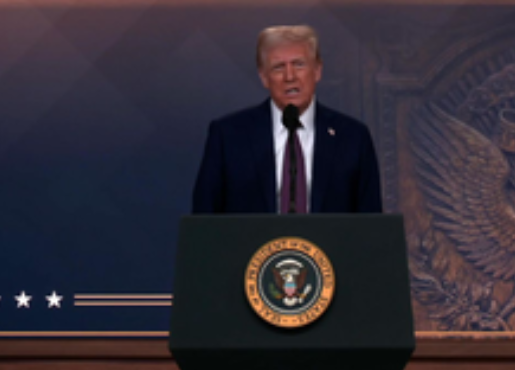Business
'Make products in America or face tariffs': Donald Trump issues ultimatum at World Economic Forum

Davos (Switzerland), Jan 24
US President Donald Trump has invited global businesses to manufacture their products in the US and promised them lower taxes but also issued a stern warning that if they choose to produce their goods elsewhere, they would have to pay tariffs worth 'billions and trillions' of dollars.
Virtually addressing the World Economic Forum (WEF) in Davos, Switzerland, on Thursday, Trump promised substantial tax cuts to businesses that choose to produce in the US.
"My message to every business in the world is very simple. Come make your product in America, and we will give you among the lowest taxes of any nation on Earth. We're bringing them down very substantially, even from the original Trump tax cuts," he said.
For businesses choosing not to manufacture in the US, Trump warned, "But if you don't make your product in America, which is your prerogative, then very simply, you will have to pay a tariff differing amounts, but a tariff which will direct hundreds of billions of dollars and even trillions of dollars into our treasury to strengthen our economy and pay down debt."
He further asserted that there is "no better place" than the "good old USA" to create jobs and build factories under the Trump administration.
"Under the Trump administration, there will be no better place on earth to create jobs, build factories, or grow a company than right here in the good old USA," he added.
Trump has proposed a 15 per cent corporate tax rate for companies that manufacture in the US, subject to approval from Congress.
Trump began his presidency on Monday without immediately imposing the tariffs he had promised during his election campaign, including a 10 per cent duty on global imports and 60 per cent on goods from China.
But he said at that time that Canada and Mexico faced a 25 per cent duty on February 1 on goods they send to the US because of illegal immigration and illicit drug shipments, including fentanyl, across their US borders. Trump on Tuesday extended the February 1 deadline to China, threatening a 10 per cent duty.
Referring to the relations with Canada, the US President, noted that the US has been at a deficit of nearly $200 billion or $250 billion with Canada, which he argued was unfair.
He again reiterated his point to make Canada the 51st US state, adding that in that case, there would be no need to impose a tariff on it.
"Canada, we have a tremendous deficit with Canada. We're not going to have that anymore. We can't do it. It's, I don't know if it's good for them. As you probably know, I say you can always become a state. Then if you're a state, we won't have a deficit. We won't have to tariff you," he said.
"But Canada has been very tough to deal with over the years, and it's not fair that we should have a $200 billion or $250 billion deficit," he added.
Trump also highlighted that the US no longer relies on Canada for products like cars, lumber, and oil.
"We don't need them to make our cars and they make a lot of them. We don't need their lumber because we have our own forests... We don't need their oil and gas. We have more than anybody," he said.
Recently, Trump announced that his administration is planning to impose 25 per cent tariffs on imports from Mexico and Canada.
The US President, for some time, has been saying that Canada should be made the 51st US State to avoid facing these tariffs.
He even referred to outgoing Canadian Prime Minister Justin Trudeau as "Governor of state of Canada".
He said he plans to ask Saudi Arabia and the Organisation of the Petroleum Exporting Countries (OPEC) to cut the price of oil they produce to boost the global economy.
He contended that if the current global oil price -- about $77 a barrel -- is cut, "the war in Ukraine will end immediately." Russia uses revenue from its own oil production to help fund its three-year war on neighbouring Ukraine.
Trump said that in the global economy, the US "just wants to be treated fairly by other countries".
He said the US wants to have a "fair relationship" with China, the world's second-biggest economy.
"We don't want to take advantage," he said of Washington-Beijing relations.
"We just want to have a level playing field."



































